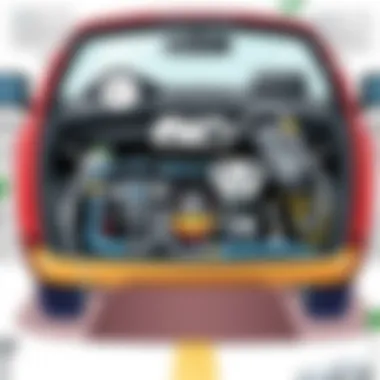Mastering Car Payment Swaps: Essential Insights


Intro
In today's financial landscape, understanding the nuances of car payment swaps can be the key to optimizing your budget. Many don’t realize that just like any other financial tool, car payment swaps come with their own set of advantages and pitfalls. So, let’s roll up our sleeves and delve into this topic, shedding light on what car payment swaps entail, why they might make sense for your financial strategy, and the potential impact on your bottom line.
Car payment swaps allow individuals to exchange their current vehicle payment obligations with another party, often aiming to align their payment plans with their financial circumstances or preferences. Think of it as trading baseball cards; each party hopes to end up with something more fitting for their collection, and similarly, in car swaps, both parties toy with the idea of better alignment to their fiscal responsibilities.
This area is not commonly discussed, yet it holds a significant place in effective personal finance management. From market conditions that influence the viability of swaps, to the subtleties of the paperwork involved, it's crucial to approach this financial maneuver with both caution and strategy.
As we peel back the layers, we will address vital terrains such as key financial concepts, investment strategies that bear relevance, and thorough comparisons of the costs and benefits involved in these swaps. A measured understanding will empower you to navigate this financial terrain with confidence, enhancing your decision-making prowess. So let's embark on this journey together.
Intro to Car Payment Swaps
The concept of car payment swaps may not be a household phrase yet, but its significance in modern vehicle financing cannot be overstated. As individuals navigate the shifting landscape of financial responsibilities, an increasing number of people are discovering the potential benefits embedded in these swaps. A car payment swap allows individuals to exchange their existing car payments with another party, often resulting in more manageable financial situations. For many, such transactions emerge as a strategic tool for optimizing their vehicle budgeting — a savvy move in a climate where financial flexibility is paramount.
In this guide, we will dissect the intricacies of car payment swaps. The primary goal here is to lay bare all the components that contribute to effective execution of this concept, emphasizing both the advantages and potential pitfalls. Why is it crucial to grasp the mechanics of car payment swaps? First off, for car owners, understanding this strategy opens doors to enhanced financial fluidity. Rather than feeling ensnared in a rigid loan structure, individuals can explore alternatives.
Consider the modern car buyer: prices for vehicles have soared, and financing options can often feel like a maze. Through informed decision-making and strategic timing, engaging in a car payment swap can offer cost savings, as well as the flexibility to adjust one’s vehicle financing plans. This article endeavors to illuminate these opportunities, ensuring that participants not only grasp how swaps function but also recognize the broader implications for their personal finances.
"Understanding the nuances of car payment swaps can significantly reshape your financial landscape," a sentiment that resonates deeply as we explore these transactions heavily shaped by market dynamics and individual circumstances.
By diving into the historical context and mechanics of car payment swaps, we will unravel the tapestry of benefits and risks associated with this practice. Join us in navigating through the complexities in the following sections to become better equipped in making informed choices as a consumer in today's evolving automotive financing marketplace.
Mechanics of Car Payment Swaps
Understanding the mechanics of car payment swaps is crucial for anyone considering leveraging this financial strategy. It provides a framework for how these arrangements are formed and executed, offering insight into their functioning, advantages, and potential pitfalls. A solid grasp on this topic allows individuals to make informed decisions, exploring whether a swap is the right move given their unique circumstances. In today’s versatile financial landscape, knowing the inner workings of car payment swaps can provide a significant advantage.
How Car Payment Swaps Work
At its core, a car payment swap involves two parties exchanging their existing car loans. This can happen for several reasons – perhaps one party wants to switch to a different vehicle, or maybe another is looking for a better financial arrangement due to changing personal circumstances. The process generally follows these steps:
- Assessment of Financial Situations: Each party evaluates their current loan terms, interest rates, and individual financial circumstances. This step is crucial as it highlights what each person stands to gain or lose.
- Finding the Right Match: This is where networking comes into play. Often, individuals may find potential swap partners through online platforms, community groups, or consulting services. It’s not about luck but rather about mutual benefit.
- Negotiation: This step is critical. Both parties discuss the terms of their loans and the value of their vehicles. It’s important here to have all information laid out, ensuring neither party feels shortchanged.
“Communication is key; making sure all the terms are clear can avoid misunderstandings down the road.”
- Contract Creation: Once both parties agree on the swap, a legally binding agreement is drafted. This document should outline the specifics of the swap, including payment amounts and any conditions that may apply post-swap.
- Transfer of Ownership: This is the final stage, which typically involves working with financial institutions to finalize the swap and ensure that both loans are transferred correctly. Proper paperwork is essential during this step to avoid any legal issues later.
The foundational structure of car payment swaps is quite straightforward, yet the intricate subtleties involved can make or break these transactions. Each step demands diligence and attention to detail, as the outcomes heavily depend on precise execution and agreement.
Key Components Involved
Several key components contribute to the successful execution of car payment swaps:
- Loan Terms: Every swap involves two different loan agreements, so understanding the terms of each is vitally important. This includes interest rates, payment schedules, and any fees associated with transferring loans.
- Vehicle Valuation: Knowing the current market value of each vehicle is essential. This will help each party understand the equity involved in their respective cars, allowing for fair negotiations. Market trends and vehicle conditions can greatly impact these valuations.
- Legal Documentation: Contracts play a significant role in protecting both parties during the swap. They serve not just as agreements but as a buffer against potential disputes. It’s vital that all contractual obligations are clear and that each party understands their commitments.
- Communication: As mentioned earlier, effective dialogue between the parties can make a world of difference. Clear communication helps navigate expectations and fosters a collaborative environment throughout the entire process.
- Advisory Services: For those who may not feel confident in managing the nuances of a swap, consultation with financial advisors or legal professionals can be beneficial. They provide valuable insights and help navigate the complexities.
Benefits of Engaging in Car Payment Swaps
Engaging in car payment swaps can significantly influence an individual's financial landscape. This practice goes beyond the simple exchange of payment responsibilities; it offers an array of potential benefits that can suit a variety of personal situations. Understanding these advantages can empower one to make informed decisions that align well with both their financial goals and lifestyle needs.
Cost Savings Potential
When considering a car payment swap, one of the most striking benefits is the potential for cost savings. Often, car owners find themselves in a situation where their existing car loan terms are less favorable due to changes in interest rates or personal updated credit scores. A swap can help to mitigate these financial burdens.
By trading a high-interest payment plan for a better rate, individuals can save significantly. For instance, if someone's loan carried a 7% interest rate and they switched to a fellow buyer with a 4% rate, the difference in payments could result in substantial monthly savings.
Furthermore, in certain circumstances, car payment swaps can also alleviate the risk of negative equity. This is when the current market value of the vehicle is less than what is owed on the loan. Swapping can enable owners to transition out of an unfavorable position and potentially into a vehicle that holds its value better.
In sum, realizing cost savings is not only an economic incentive but also a strategic move that reflects adaptability in managing one’s auto financing.
Flexibility in Vehicle Financing
Flexibility stands out as another notable advantage in the realm of car payment swaps. The automotive market constantly shifts; trends change, and so do individual preferences and needs. Engaging in a swap can present a unique opportunity to align one’s vehicle financing with real-time market conditions and personal situations.
Imagine a family that started with an SUV to accommodate growing children. A few years later, those kids have become teenagers, and the family dynamics have shifted. Instead of struggling with car payments for a vehicle that no longer fits their lifestyle, a swap provides the flexibility to change vehicles without the burden of early loan termination penalties. This fluid approach to financing allows individuals to embrace new vehicle options or styles better suited to their evolving needs.
Additionally, a swap may offer shorter financing terms or alternative payment structures, allowing for greater options in terms of customization of monthly payments. As personal circumstances fluctuate, such as job changes or relocations, the flexibility provided by a car payment swap can serve to accommodate those shifting life contexts without the headaches often associated with traditional auto loans.
Ultimately, embracing the concept of car payment swaps can lead to a more responsive and adaptable approach within the automotive financing landscape, enhancing both utility and satisfaction while managing one's budget.
"In an ever-evolving market, flexibility is not just an advantage; it's a necessity."


For those interested in furthering their understanding of car payment swaps, resources like Wikipedia on Personal Finance or Investopedia's Guide can prove helpful. Understanding the intricacies of one's financial situation enables better decision-making in terms of vehicle financing options.
Risks Associated with Car Payment Swaps
When considering car payment swaps, it’s paramount to balance ambition with caution. While there are benefits to this financing strategy, understanding the potential risks involved can save individuals from unforeseen complications. Failing to recognize these risks might lead to financial strain down the line. In this section, we will delve into the financial risks and the potential for complicated transactions that can arise when engaging in car payment swaps.
Financial Risks
The landscape of financial risks tied to car payment swaps can feel a bit like walking a tightrope without a safety net. First off, it's essential to realize that while you might hope to save some coins by switching payments, there’s no guarantee of that happening. Involvement in a swap might lead to increased monthly payments, higher interest rates, or unfavorable loan terms, especially if the credit rating of the other party is questionable.
Furthermore, consider how the value of the car may fluctuate over time. If the car you are taking on has a higher depreciation rate, you might find yourself owing more on the vehicle than it’s worth, also known as being "upside down" on a loan.
- Payment Structure Issues - In a swap, the payment schedules could differ significantly between vehicles. If you are not careful, you might end up with a payment that’s a financial burden rather than a relief.
- Hidden Fees - There's often a bevy of administrative fees, transfer costs, or possible penalties for early repayments that sneaky lenders might not disclose upfront. This unexpected financial baggage can catch you off guard.
- Late Payments - If either party has missed a payment history, that could reflect negatively on both. It’s a shared risk; if someone falls behind, the associated penalties might slice into your pockets as well.
Recognizing these financial risks can lead to a more informed decision. Thorough research and consideration can be a lifesaver, ensuring you don’t end up paying more than you bargained for.
Potential for Complicated Transactions
The process of car payment swaps, like untangling a ball of yarn, can become complicated if not handled with care. When two parties engage in a swap, they often overlook critical aspects that can culminate in a cumbersome transaction.
First, consider the paperwork involved. Each swap will require multiple agreements, signatures, and possibly extensive negotiations, depending on the terms. "If you don’t dot the i's and cross the t's, you might find yourself in a pickle.” Inadequate documentation can lead to misunderstandings or even legal issues later.
Second, potential impacts on insurance can arise. Swapping vehicles entails updating policy details, which can be a challenge especially if significant changes are made. Ensuring that both parties have proper coverage during the transition period can easily become a headache.
Additionally, let's not forget that timelines can be tricky to align. One party may be ready to proceed but the other might encounter unforeseen delays. If communication isn’t clear, this can lead to dissatisfaction or missed opportunities, which leaves a bitter taste in everyone’s mouth.
In summary, while car payment swaps can provide an advantageous way to adjust your vehicle financing, it’s vital to stay aware of potential pitfalls. Taking the time to navigate both financial risks and the intricacies of complicated transactions will help safeguard your investment and ensure smooth sailing ahead.
Informed decision-making is key. By understanding the potential risks, one can maneuver through the landscape of car payment swaps with clarity and confidence.
For more insights on managing car transactions, you may explore resources like Consumer Finance Protection Bureau or articles from Nolo.
Legal Considerations in Car Payment Swaps
When engaging in car payment swaps, understanding the legal landscape is crucial. This section delves into the core legal considerations that individuals and entities must keep in mind. With a range of laws governing contracts and consumer rights, being informed protects both parties in a swap.
Contractual Obligations
At the heart of any car payment swap lies a contract. This document outlines the agreement made between the parties involved — typically a lender and a borrower. Contractual obligations can often be like the fine print in a lease agreement; it’s not until you really look closely that you understand the full implications.
When drafting or reviewing a contract, you should pay attention to specifics such as the amount being swapped, payment schedules, and any fees involved. Ambiguities can lead to disputes later. One essential aspect to be aware of is the default clause. If one party fails to adhere to the terms, what are the consequences?
In some cases, the lender may reserve the right to reclaim the vehicle or impose penalties if payments are not met. In short, clarity in these obligations can help prevent misunderstandings and protect your financial interests.
Consumer Protection Laws
Consumer protection laws are designed to safeguard buyers in various transactions, including car payment swaps. In the U.S., the Consumer Financial Protection Bureau has set regulations that ensure transparency and fairness in lending practices. The last thing anyone wants is to find they’ve fallen victim to misleading terms or hidden costs—in fact, it’s a real pitfall for budding car swappers.
One notable aspect of these laws is the Truth in Lending Act, which necessitates lenders to disclose all terms related to a loan, including interest rates, total payments, and other potential charges. This requirement means that both parties should have a clear understanding of the obligations they’re entering into. It’s a no-brainer but is often overlooked.
Additionally, understanding state-based consumer protection laws can vary, adding layers that must be considered. Each state might have specifics, like regulating interest rates or governing the repossession of vehicles. Keeping abreast of these regulations is not just prudent; it’s critical for safeguarding your rights in the swap process.
Always consult with a legal professional when considering any contracts or agreements to ensure compliance with applicable laws.
In summary, legal considerations in car payment swaps are interconnected. Contractual obligations set the framework for the swap, while consumer protection laws serve to uphold the integrity of these agreements. Understanding both ensures that participants can navigate swaps safely and effectively, protecting not only their wallets but also their peace of mind.
Identifying the Right Time for a Swap
Identifying the ideal moment for a car payment swap can significantly influence the overall success of the transaction. Timing, as they say, is everything, and in the arena of car financing, it holds true too. Whether you're looking to bolster your financial standing or simply seeking a different vehicle, understanding when to initiate a swap will ultimately determine your financial health and satisfaction with your choice.
One of the most impactful factors to consider is the market condition. The automotive market, much like any other market, is subject to fluctuations driven by supply and demand, economic indicators, and consumer sentiments. A favorable market might present an opportunity to secure a better interest rate or swap to a more desirable vehicle without hence breaking the bank. Conversely, a downturn in the market might lead to negative equity, where you owe more on your vehicle than it's worth, making a swap a tricky proposition.
Market Conditions and Their Impact
Market conditions are influenced by various factors. When new car models are released, used car values can drop, providing an ideal window for swapping. For instance, if you find yourself sitting on an underappreciated trade-in—maybe a vehicle that still runs like a top but isn't what buyers are looking for—you might want to swap sooner rather than later.
Additionally, keeping an eye on rising interest rates or economic indicators, such as the unemployment rate or inflation, is just as essential. If rates are projected to rise, this could be your cue to swap sooner; securing a lower fixed rate could save you quite a bit in the long term. Understanding these nuances can literally save thousands or, at the very least, improve your vehicle ownership experience.
Personal Financial Situations


In tandem with market conditions, your personal financial situation cannot be overstated in its importance. Are you nearing the end of a financial milestone, such as paying off debt or possibly getting a raise? It’s wise to assess your current financial commitments and future projections. If your situation is likely to improve, perhaps waiting for that next financial tidbit might give you leverage during negotiations on your next swap.
Sometimes, life throws curveballs. Expecting a significant change, like a new job that requires more traveling or an expanding family, may warrant an immediate swap. In such scenarios, delay can cost more than one’s willing to stake.
Analyzing your credit score is another piece of the puzzle. A higher score can get you a better deal on a swap. If you've recently improved your credit profile, recognize that this shift opens new doors, and you may want to explore a swap sooner than later.
Each swap is unique, shaped by the specific circumstances that surround it. Armed with the right knowledge, you’ll be much better positioned to make choices that will serve you well, both today and in the long run.
Comparative Analysis with Other Financial Strategies
In the realm of automotive finance, one can hardly overlook the concept of car payment swaps alongside traditional loan options and leasing arrangements. Understanding these alternatives can offer individuals and businesses clarity in their financial decision-making process. This analysis will highlight the benefits and considerations tied to different financial strategies, enabling a more informed choice when it comes to vehicle financing.
Traditional Loan Options
When it comes to vehicular financing, traditional auto loans often come to mind first. A standard route for most buyers, obtaining a loan means securing a lump sum from a lender, which is then used to purchase the car outright. As the borrower, one makes monthly payments over a specified period, which typically spans between three to seven years.
Advantages of Traditional Loans:
- Ownership: You own the vehicle outright once it's paid off, giving you free rein to modifier or drive it as you please.
- Long-term Value: Building equity is a key benefit; the car’s value (though it depreciates) still contributes to your overall net worth.
- Fixed Payments: Many loans offer fixed interest rates, providing stability in budgeting and financial forecasting.
Considerations:
- Higher Monthly Expenses: Compared to car payment swaps or leases, traditional loans often command higher monthly payments that can strain your budget.
- Depreciation: Right after you drive off the lot, the car loses value, impacting the resale potential if not maintained properly.
Leasing vs. Swapping
Leasing has risen in popularity, often viewed as a flexible alternative, but it's essential to distinguish how it compares with car payment swaps. Leasing typically involves paying to drive a car for a set number of miles over a particularly short period, often two or three years. You return the vehicle at the end of the lease and are then free to lease a new model.
In contrast, car payment swaps allow individuals to exchange their current car payments for those of another vehicle, often without the need for a down payment, which makes it less burdensome.
Benefits of Leasing:
- Newer Models: Leasing grants access to the latest vehicles, capturing the latest technology and safety features without hefty buy-in costs.
- Lower Payments: Monthly payments tend to be lower compared to traditional loans, hence making higher-end vehicles more accessible.
Considerations of Leasing:
- No Ownership: At the end of the lease, you walk away with no equity in the vehicle.
- Mileage Limits: Most leases come with mileage limits, and exceeding these can lead to costly penalties, which can restrict travel options.
Advantages of Car Payment Swaps:
- Flexibility: Swapping payments offers a unique opportunity to shift to different vehicles based on personal circumstances or preferences without a stringent commitment.
- Risk Management: For those facing financial fluctuations, a swap can mitigate the pressure of maintaining a traditional loan payment.
In essence, navigating between these financial strategies helps individuals make informed choices that best align with their financial goals and lifestyle preferences. Understanding each option aids in determining the best fit for one’s unique situation, a vital consideration for high-IQ audiences looking for efficiency and clarity in financial decisions.
Case Studies of Successful Swaps
Examining real-world instances of car payment swaps serves as a valuable approach to understand the practical implications of this financing strategy. Such case studies reveal the motivations behind swaps and offer insights into their outcomes. They highlight not just the mechanics but the emotional and financial aspects individuals or corporations face. Understanding these factors is crucial for anyone considering a swap.
Examples from Individuals
Consider the case of Sarah, a middle-level manager who decided to swap her existing car. Sarah had taken a loan to finance her previous vehicle, a stylish yet costly sedan. However, after some changes in her financial situation, she realized that the monthly payments were becoming burdensome.
After some research, Sarah stumbled upon car payment swaps. She connected with an individual looking to move from a compact car to a larger SUV. The arrangement allowed Sarah to take on the SUV of her dreams while easing her financial strain due to significantly lower payments. In her case, the swap not only enhanced her driving experience but also provided economic relief.
The personal stories like Sarah's reflect a universal truth about car payment swaps: they can be a flexible solution for individuals whose financial landscapes are shifting. Moreover, this case illustrates a crucial point: it’s not just about the cars involved, but also the financial liberations they can offer.
Corporate Swaps and Their Impacts
Turning to the corporate realm, consider a tech firm that often updates its fleet to maintain a modern image and enhance employee satisfaction. The company, entangled in a lease agreement for a recent model, found itself in a pinch when economic downturns affected its cash flow. Rather than continue paying premiums for the existing cars, the firm looked into executing a swap.
By engaging in a swap with a neighboring business that needed more high-performance vehicles, this tech firm managed to offload its leasing burden while gaining access to models better suited for its current needs. The swap not only optimized the company’s vehicle usage for practicality but also minimized financial risks associated with owning vehicles that had become less relevant for their operations.
Through these corporate examples, one can see that car payment swaps can empower businesses to adapt and innovate in challenging circumstances. These swaps pave the way for more efficient resource allocation and can drive companies toward their strategic goals in a competitive environment.
Key takeaway: Both individuals and corporations can derive benefits from swaps–they’re not merely transactions but reflections of strategic decision-making and financial management in action.
Resources for Further Insights
- Wikipedia on Car Financing
- Investopedia on Vehicle Loans
- Consumer Financial Protection Bureau for consumer protection laws and guidelines.


Tools and Resources for Car Payment Swaps
Navigating the huze world of car payment swaps can be tricky without the right tools and resources. Fortunately, there are several instrumental aids available. These assist both inexperienced buyers and seasoned financiers in making well-informed decisions. Understanding these can lead to cost savings and enhanced convenience.
Calculators and Comparators
Car payment calculators serve as essential tools in the decision-making process. They help individuals estimate what their payments might look like if they decide to swap their current vehicle for another, providing a clear picture of financial commitments. Many of these calculators account for factors such as interest rates, loan terms, and equity in the current car, helping users better understand their financial landscape.
Here’s a closer look at some of the main benefits of using these calculators:
- Personalized Estimates: Different calculators cater to different financial situations, thus enabling the users to input their specific data, such as trade-in value and desired financing terms.
- Effectiveness in Planning: By comparing payment scenarios between their current situation and a potential swap, users can gauge whether a swap makes financial sense.
- Immediate Feedback: Users gain quick insights, aligning their expectations with realistic outcomes in mere minutes.
It’s crucial to choose calculators from reputable sources. Be wary of sites that could skew results through biased algorithms. Sites like Bankrate or Edmunds are quite user-friendly.
Professional Guidance and Consultation Services
When it comes to something as substantial as a car payment swap, professional guidance can be invaluable. Hiring financial consultants who specialize in auto loans can shed light on complex aspects of the process that may not be immediately apparent.
Consider these key points when thinking about professional services:
- Expertise in Negotiation: Experienced consultants know how to work with lenders and dealerships. Their ability to negotiate can lead to better terms for the individual.
- Tailored Advice: These professionals can evaluate an individual’s financial goals and suggest swaps that align with them. For instance, if someone is looking to reduce monthly payments, they can steer them toward models with lower residual values.
- Streamlined Processes: With professionals involved, the process can become smoother and less stressful, as they handle more of the legwork.
Regardless of the options, seeking professional advice is always a prudent choice when big financial decisions, like car payment swaps, are on the table.
Remember, utilizing both calculators for initial understanding and professional advice for nuanced reasoning can place you in a prime position to make the most informed choices possible!
Future Trends in Car Payment Swaps
The landscape of car payment swaps is evolving, driven by technological advancements and shifts in regulatory frameworks. Staying updated on these trends is vital for consumers and industry stakeholders alike, as they can significantly impact the effectiveness and efficiency of swaps. Understanding how these factors interplay can arm individuals with the knowledge necessary to navigate their decisions effectively.
Emerging Technologies and Their Influence
As technology marches forward, it's hard to ignore the profound effects it has on financial transactions and automotive financing. For instance, the rise of mobile apps and online platforms has transformed how people engage in car payment swaps. Now, individuals can browse, compare, and negotiate terms without ever stepping foot in a dealership. These platforms often use algorithms to match users with potential swapping partners, ensuring quicker and often better deals.
Moreover, the integration of blockchain technology is generating significant buzz. By offering a secure and transparent way to verify transactions, it can enhance trust among parties in a swap. This technological leap can mitigate common fears about fraud and misrepresentation, encouraging more folks to consider swaps as a viable financial strategy.
Here are some possible influences of emerging technologies on car payment swaps:
- Increased Accessibility: With mobile technology, more individuals can easily access information and tools needed for swaps.
- Enhanced Transparency: Blockchain can ensure that all transactions are easily verifiable and tamper-proof.
- Data-Driven Decisions: AI can analyze market trends in real-time, enabling better timing for swaps and identifying advantageous financial opportunities.
Potential Regulatory Changes
The regulatory environment for car payment swaps is not static. As lawmakers respond to technological advancements and consumer needs, regulations can shift significantly. It's vital that consumers and professionals keep an eye on policy developments that may impact their ability to engage in swaps. Regulatory changes can affect everything from taxation on swap transactions to consumer protection laws.
For instance, we might see increased scrutiny over how financing terms are communicated. Clearer guidelines might help consumers comprehend their obligations and rights much better. Increased transparency in contracts can also enhance trust in the process.
With potential changes in mind, here are some highlighted points to consider:
- Potential for Streamlined Processes: As regulations adapt to technology, processes may become less convoluted, making swaps even easier.
- Greater Consumer Protections: New regulations may tighten the reins on misleading practices and ensure a fair playing ground for both parties involved.
- Impact on Fees and Interest Rates: Changes in how swaps are regulated might influence associated costs, which could benefit or burden consumers depending on the area.
Staying informed on technological contributions and regulatory shifts may be the difference between making a savvy swap and falling into an unfavorable deal.
Epilogue
The topic of car payment swaps holds substantial significance in the realm of personal finance. As the shifts in market dynamics continue to impact how individuals manage their car loans, a complete understanding of this concept can lead to more effective financial decisions. Engaging in a car payment swap not only opens doors to cost-saving opportunities but also provides flexibility that many traditional financing options might lack. However, the decision to engage in such transactions shouldn't be made lightly.
Summarizing Key Points
Throughout this guide, several critical points emerged:
- Definition and Context: Car payment swaps involve transferring the liability of a car loan to another person, enabling them to take over payments on a vehicle. This might arise from situational changes, such as job relocations or financial difficulties.
- Mechanics and Benefits: By understanding how swaps function, individuals can capitalize on the potential financial benefits, like lower payments or better vehicle choices tailored to their needs.
- Risks and Legalities: However, it's indispensable to consider the risks involved, such as the potential complications in the transaction process and the legalities tied to any agreement.
- Market Timing and Tools: Recognizing the right moment for a swap, along with leveraging available tools, can significantly enhance the transaction process.
In managing car payments, knowledge truly is power. Each swap carries unique circumstances that can incite excellent financial outcomes if appropriately navigated.
Encouraging Informed Decision-Making
When contemplating a car payment swap, being informed is key to achieving desired outcomes. Here are essential factors to consider:
- Thorough Research: Always investigate the potential impacts on your credit score and overall financial health. Knowledge of both market conditions and your personal financial situation should guide your decision.
- Utilization of Resources: Tools such as online calculators can assist in understanding cost implications. Professional services can also offer clarity on contractual obligations and consumer protections available.
- Realistic Assessment: Not every swap is right for every individual. Assess your circumstances carefully to determine whether a swap may benefit you financially or if some traditional financing options might be more suitable.
In the world of car payment swaps, making choices based on comprehensive understanding and practical knowledge can set one on a path towards better financial management, ultimately leading to healthier budgets and greater peace of mind.
"Informed decisions are the foundation of financial success. Knowledge and clarity in car payment swaps can save both time and money."
For further exploration on car payment swaps and personal finance strategies, visit Investopedia, Khan Academy, or Forbes.
Make sure you always evaluate your options carefully and consult with financial advisors when necessary.







